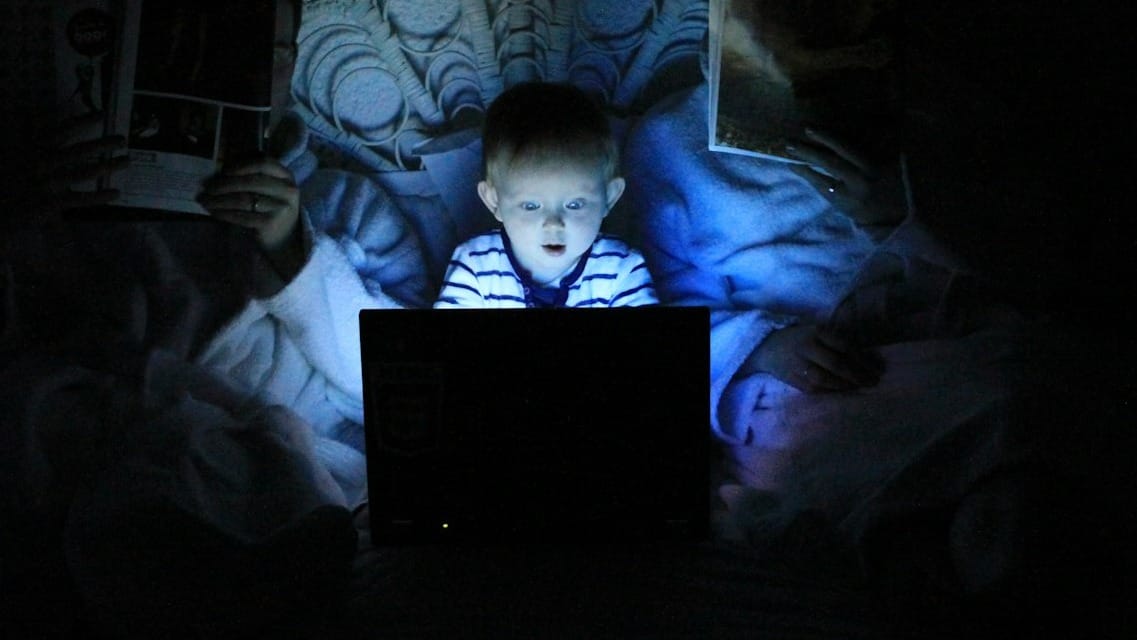Unraveling the Impact of Screen Time on Toddler Sensory Health

In today's digital age, toddlers are growing up surrounded by screens, but what are the consequences? Join us as we delve into groundbreaking research from Drexel's College of Medicine, shedding light on how screen time may influence sensory processing behaviors in young children. From disengagement to sensory overload, discover the hidden impacts that excessive screen exposure can have on your child's development. Gain valuable insights and evidence-based strategies to navigate the digital landscape and promote healthy growth for your little ones. Don't miss out on this essential guide to understanding and managing screen time in the modern era of parenting.
Imagine a world where children learn to swipe before they speak. In today's digital age, the screens that catch toddlers' eyes might also be shaping their futures in ways we are only beginning to understand.
In the digital era, screen time has become a hot topic for parents and experts concerned about toddler development. As we delve into the effects of digital devices on our children, it is crucial to understand how these interactions influence language acquisition and potentially contribute to behavioral problems. The early years of a child's life are pivotal, as they lay the groundwork for cognitive, emotional, and social development. It is during this sensitive period that experiences and interactions can profoundly shape a child's future learning, behavior, and overall health. With the prevalence of tablets, smartphones, and on-demand video and TV, screen time has become an integral part of many toddlers' lives, making it imperative to understand its potential impact on their development.
Recent research carried out by Drexel's College of Medicine provides new insights into how screen time may influence toddlers, particularly in terms of their sensory processing behaviors. The study, published in the journal JAMA Pediatrics, suggests that babies and toddlers exposed to television or video viewing may be more likely to show atypical sensory behaviors. These behaviors include being disengaged and disinterested in activities, seeking more intense stimulation, or feeling overwhelmed by sensations such as loud sounds or bright lights.
We seek to unpack the findings of this pivotal research, examining the implications for toddler development and offering evidence-based advice for parents facing the challenges of screen time. By exploring the nuances of the study and its broader context, we aim to provide a comprehensive understanding of how screen time can shape the sensory world of toddlers and what steps can be taken to ensure their healthy growth in our increasingly digital environment.
Insights into Screen Time's Impact on Child Development: Unpacking Research Findings
In the study by researchers at Drexel's College of Medicine, data from the National Children’s Study was meticulously analyzed to understand the impact of screen time on the sensory processing abilities of toddlers. The study, which focused on the television and DVD-watching habits of babies and toddlers, assessed sensory processing outcomes at 33 months using the Infant/Toddler Sensory Profile (ITSP).
The ITSP is a comprehensive questionnaire completed by parents or caregivers, designed to provide insights into how children process sensory information from their environment. This includes their reactions to what they see, hear, smell, and touch. The ITSP evaluates patterns of sensory processing, such as low registration (being less sensitive or slower to respond to stimuli), sensation seeking (excessively touching or smelling objects), sensory sensitivity (being overly upset or irritated by lights and noise), and sensation avoiding (actively trying to control their environment to avoid discomfort).
The study consisted of 1,471 children (50% male) from across the United States, with data collected between 2011 and 2014. The researchers found that at 12 months, any screen exposure compared to no screen viewing was associated with a 105% greater likelihood of exhibiting "high" sensory behaviors related to low registration at 33 months. At 18 months, each additional hour of daily screen time was linked to a 23% increased odds of exhibiting "high" sensory behaviors related to sensation avoiding and low registration. By 24 months, each additional hour of daily screen time was associated with a 20% increased odds of "high" sensation seeking, sensory sensitivity, and sensation avoiding at 33 months.
These findings are alarming, considering the critical role sensory processing plays in toddler development. Sensory processing skills are the foundation upon which children build their understanding of the world. They influence the development of motor skills, language, and social interactions. When these skills are compromised, it can lead to significant learning and behavioral challenges.
The study's authors adjusted for various factors, including age, premature birth, caregiver education, race/ethnicity, and the frequency of play or walks with the caregiver. Despite these adjustments, the association between screen time and atypical sensory processing remained significant, suggesting a strong link between early-life screen exposure and later sensory processing issues.
The implications of these findings extend beyond immediate sensory processing concerns. The study adds to a growing body of evidence linking screen time in infants and toddlers to a range of health and developmental outcomes, such as language delay, autism spectrum disorder, behavioral issues, sleep struggles, attention problems, and problem-solving delays. Lead author Karen Heffler, MD, an associate professor of Psychiatry at Drexel’s College of Medicine, emphasized the potential implications for attention deficit hyperactivity disorder and autism, as atypical sensory processing is much more prevalent in these populations. She noted that repetitive behavior, a hallmark of autism spectrum disorder, is highly correlated with atypical sensory processing.
The research conducted by Drexel's College of Medicine provides some of the earliest data linking early-life digital media exposure with later atypical sensory processing across multiple behaviors. The authors call for future research to better understand the mechanisms driving the association between early-life screen time and atypical sensory processing. This study serves as a crucial step in understanding the long-term effects of screen time on child development and underscores the importance of establishing healthy screen time habits from an early age.

Exploring the Consequences of Excessive Screen Time on Toddler Development
The digital era has created a new set of challenges for toddler development, particularly as it relates to the integration of screen time into the daily lives of toddlers. As we have seen, the study conducted by researchers at Drexel's College of Medicine provides compelling evidence that excessive screen time can have detrimental effects on sensory processing in toddlers, which may lead to a circle of developmental and behavioral problems.
Sensory processing is the mechanism by which we receive and respond to sensory input from our environment. It is a cornerstone of toddler development, underpinning everything from motor skills and language development to social interactions. The Drexel study found that children exposed to greater amounts of TV viewing by their second birthday were more likely to exhibit atypical sensory processing behaviors by 33 months old. These behaviors include "sensation seeking," "sensation avoiding," and "low registration," which refer to the over or under-reaction to sensory stimuli.
Atypical sensory processing is more prevalent in children with developmental disorders such as ADHD and autism spectrum disorder (ASD). For instance, children with ASD may engage in greater sensation seeking or sensation avoiding, and exhibit heightened sensory sensitivity and low registration. These sensory processing irregularities have been associated with irritability, hyperactivity, eating and sleeping difficulties, as well as social challenges. Similarly, in children with ADHD, atypical sensory processing is linked to executive function difficulties, anxiety, and a lower quality of life.
The implications of these findings are significant. Excessive screen time has been linked to language delays, autism spectrum disorder, behavioral issues, sleep struggles, attention problems, and problem-solving delays. The study's authors suggest that the repetitive behavior seen in ASD is highly correlated with atypical sensory processing, and future research may determine whether early life screen time could contribute to the sensory brain hyperconnectivity observed in ASD, such as heightened brain responses to sensory stimulation.
Given the potential link between high screen time and a growing list of developmental and behavioral problems, it is suggested that toddlers exhibiting symptoms of atypical sensory processing may benefit from a period of screen time reduction. This, coupled with sensory processing practices delivered by occupational therapists, could be a proactive approach to mitigating the negative effects of excessive screen time.
The study's findings underscore the importance of parent training and education in minimizing screen time for young children. While some parents may rely on screen time due to exhaustion or a lack of affordable alternatives, the long-term developmental stakes highlight the need for finding and promoting healthier alternatives.

Screen Time and Children: Essential Insights for Parents
Reducing screen time for toddlers presents crucial challenges for parents, often stemming from factors such as exhaustion and the lack of affordable alternatives. The pervasive nature of screens and societal norms surrounding technology use further contribute to increased screen time among toddlers.
Parents frequently find themselves in situations where screen time becomes a convenient solution, particularly in the mentioned situations of exhaustion or other leisure alternatives. The ordinariness of screens in modern society, together with the prevalence of digital media, has normalized their use as a means of entertainment and distraction for young children. These factors collectively contribute to the challenge of minimizing screen time and promoting alternative activities for toddlers.
Educating parents about the potential risks associated with excessive screen time and providing them with support and viable alternatives are crucial steps in mitigating these challenges. By equipping parents with the knowledge and resources necessary to understand the implications of high screen time, they can make informed decisions about managing their child's exposure to digital media. Additionally, these alternatives can help parents navigate the complexities of reducing screen time while simultaneously promoting healthy development in their toddlers.
The study conducted by researchers at Drexel's College of Medicine underscores the significance of parent education and support in addressing the challenges associated with minimizing screen time for young children. While it is evident that many toddlers are exposed to excessive screen time, often due to factors such as parental exhaustion and the lack of affordable alternatives, the long-term developmental implications highlight the critical need for comprehensive parent education and support initiatives.
For example, the American Academy of Pediatrics (AAP) recommends avoiding screen time for babies under 18-24 months, except for live video chatting. For children aged 2 to 5 years, screen time should be limited to no more than 1 hour per day. Parents can limit screen time by monitoring and regulating content, ensuring it is age-appropriate, and not allowing screen time to replace valuable interactions and play. Engaging toddlers in sensory-rich play activities, such as tactile play, outdoor exploration, and interactive games, can promote healthy sensory development.
The challenges related to reducing screen time for toddlers are multifaceted and deeply ingrained in modern societal norms. However, by prioritizing parent education, providing support, and offering viable alternatives, it is possible to mitigate these challenges and promote healthier screen time habits for young children. Through collaborative efforts and a shared commitment to fostering healthy development, parents can navigate the complexities of managing screen time while ensuring the well-being of their toddlers.
Navigating Challenges and Considerations Surrounding Screen Time
Reducing screen time can be challenging for parents due to factors like exhaustion and the lack of affordable alternatives. The ubiquity of screens and societal norms around technology use also contribute to increased screen time among toddlers. Some of the key challenges and considerations include:
- Exhaustion and Parental Fatigue: Many parents, particularly those with young children, experience high levels of exhaustion due to the demands of caregiving. In such circumstances, screen time can become a convenient and readily available tool for keeping children occupied, especially when parents are fatigued and in need of respite.
- Lack of Affordable Alternatives: Access to affordable and accessible alternatives to screen time, such as high-quality educational toys, books, or safe outdoor play spaces, can be limited for many families. This lack of alternatives can make it challenging for parents to reduce their child's screen time, particularly when faced with financial constraints.
- Societal Norms and Peer Pressure: The widespread use of digital media among toddlers has become a societal norm in many communities. Parents may feel pressure to conform to these norms, especially when they perceive that other families allow more screen time for their children.
- Parental Education and Support: Many parents may not be fully aware of the potential risks associated with excessive screen time. Educating parents about these risks and providing them with support and viable alternatives are crucial steps in mitigating the challenges associated with reducing screen time.
- Technological Ubiquity: Screens are common in modern society, and their use is deeply integrated into daily life. This ordinariness can make it difficult for parents to limit their child's exposure to screens, especially when digital devices are prevalent in educational settings, social environments, and even family interactions.

Taking Charge of Toddler Development: Strategies for Managing Screen Time
The evidence presented underscores the critical importance of managing screen time to support healthy sensory processing and ensure the well-being of young children. As parents, caregivers, and educators, it is imperative to prioritize activities that promote healthy development over excessive screen time, recognizing the far-reaching implications for the future of children.
Taking proactive steps to manage a child's screen time is a responsibility that cannot be understated. By prioritizing healthy sensory development and reducing screen time, parents can play a pivotal role in laying a strong foundation for their toddlers' future learning and growth. This involves not only limiting screen time but also actively engaging in alternative activities that stimulate sensory processing and encourage holistic development.
It is important upon parents and caregivers to be vigilant and discerning about the amount and nature of screen time to which young children are exposed. The implications of atypical sensory processing behaviors are far-reaching, with potential links to conditions such as ADHD and autism spectrum disorder. Therefore, it is essential to heed the guidance provided by reputable sources such as the American Academy of Pediatrics (AAP) and take proactive measures to minimize screen time for children under two years old.
The studies and guidelines provided serve as a reminder of the profound influence that screen time can have on toddler development. By embracing the responsibility to manage screen time effectively, parents can help ensure that their toddlers have every opportunity to thrive and develop into healthy, well-adjusted individuals. The journey towards healthy sensory processing and balanced screen time begins with a conscious commitment to prioritize activities that support development over excessive digital media exposure.
Jacob's Story on Toddler Screen Time
Let's talk about Jacob, a curious little 3-year-old with sparkly eyes and a love for exploring. Unlike most kids his age, Jacob's first word was "iPad" instead of the usual "mama" or "papa", or even “water”. His parents were proud of how quickly he could use a tablet, thinking it was all part of his learning. But as time went by, they started to worry. Jacob wasn't chatting like other kids his age. When he played with his cousins or had dinner with grandma and grandpa, he didn't have much to say. He knew lots of words from his apps, but he didn't use them to talk about his day or ask questions.
Jacob's mom and dad decided to get some help from people who know all about kids and how they learn. They were told that gadgets can be helpful, but they're no match for the learning that happens when you talk, laugh, and play with someone. So, they decided to cut down on the tablet time and spend more time doing fun things like playing with blo
Key Takeaways
- Talk More, Tap Less: Encourage your child to use words instead of just watching a screen. It is the best way for them to learn to speak well.
- Pick the Best, Skip the Rest: Not all screen time is bad, but make sure what your toddler watches is really teaching them something.
- Join the Fun: Do not just give your child a device and walk away. Sit with them, play the game, and talk about what is happening.
- Keep an Eye Out: Notice if your child is getting too fidgety or grumpy, as it might mean they are spending too much time with screens.
- Brain Care: Remember that a young brain grows fast, and too much screen time can change the way it develops.
- Move and Groove: Make sure your child plays and runs around, which is just as important for their health as eating veggies.
- Bedtime Peace: Turn off the screens well before bedtime to help your child sleep better and grow strong.
- Smart Choices for Smart Kids: Understand that less screen time can mean better grades and sharper thinking.
- Friends and Feelings: Help your child learn about friendship and feelings away from the screen, so they can get along well with others.
- Rules That Work: Set up some family rules for screen time that everyone understands and follows, to keep everything balanced.
Thank you for reading this post!
If you found it helpful or informative, please consider sharing a 7 day free trial with your friends, family, or colleagues who might benefit from it.
Your support helps me reach more people and spread awareness on important topics like this. Together, we can make a difference!
Additional Resources
For further reading on managing screen time and promoting healthy development in toddlers, the following resources are recommended:
Drexel University's Study on Screen Time and Sensory Processing.
American Academy of Pediatrics Screen Time Guidelines.
References
American Academy of Pediatrics. (2016). "Media and Young Minds." Pediatrics, 138(5).
Christakis, D. A. (2014). "Interactive Media Use at Younger Than the Age of 2 Years: Time to Rethink the American Academy of Pediatrics Guideline?" JAMA Pediatrics, 168(5), 399-400.
Council on Communications and Media. (2020). "Media Use in School-Aged Children and Adolescents." Pediatrics, 146(5).
Heffler, K., Acharya, B., Subedi, K., & Bennett, D. (2024). Putting Your Toddler in Front of the TV? You Might Hurt Their Ability to Process the World Around Them. JAMA Pediatrics, 2813443.
Przybylski, A. K., & Weinstein, N. (2017). "A Large-Scale Test of the Goldilocks Hypothesis: Quantifying the Relations Between Digital-Screen Use and the Mental Well-Being of Adolescents." Psychological Science, 28(2), 204-215.
Radesky, J. S., Schumacher, J., & Zuckerman, B. (2015). "Mobile and Interactive Media Use by Young Children: The Good, the Bad, and the Unknown." Pediatrics, 135(1), 1-3.
Tamana, S. K., et al. (2019). "Screen-time is associated with inattention problems in preschoolers: Results from the CHILD birth cohort study." PLOS ONE, 14(4), e0213995.
This article was written by Ariadna Paniagua, an experienced writer and editor for several institutions, papers, and websites.




